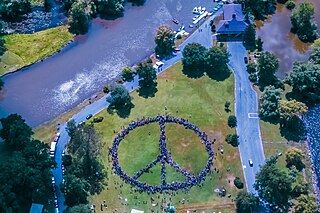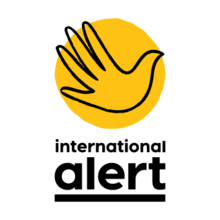
The University for Peace (UPEACE) is an international university and intergovernmental organization established as a treaty organisation by the United Nations General Assembly in 1980. The university offers postgraduate, doctoral, and executive programmes related to the study of peace and conflict, environment and development, and international law.

The United States Institute of Peace (USIP) is an American federal institution tasked with promoting conflict resolution and prevention worldwide. It provides research, analysis, and training to individuals in diplomacy, mediation, and other peace-building measures.
Martin Ennals was a British human rights activist. Ennals served as the secretary-general of Amnesty International from 1968 to 1980. He went on to help found the British human rights organisation ARTICLE 19 in 1987 and International Alert in 1985.

Peace and conflict studies or conflict analysis and resolution is a social science field that identifies and analyzes violent and nonviolent behaviors as well as the structural mechanisms attending conflicts, with a view towards understanding those processes which lead to a more desirable human condition. A variation on this, peace studies (irenology), is an interdisciplinary effort aiming at the prevention, de-escalation, and solution of conflicts by peaceful means, thereby seeking "victory" for all parties involved in the conflict.
Kumar Rupesinghe was a Sri Lankan academic and activist involved in social issues, particularly human rights, development issues, processes of globalisation, conflict prevention/resolution, and conflict transformation in the light of peacekeeping and peacebuilding for a harmonious coexistence among all peoples in the world.

Peacebuilding is an activity that aims to resolve injustice in nonviolent ways and to transform the cultural and structural conditions that generate deadly or destructive conflict. It revolves around developing constructive personal, group, and political relationships across ethnic, religious, class, national, and racial boundaries. The process includes violence prevention; conflict management, resolution, or transformation; and post-conflict reconciliation or trauma healing before, during, and after any given case of violence.

The United Nations Department of Political and Peacebuilding Affairs (DPPA) is a department of the Secretariat of the United Nations (UN) with responsibility for monitoring and assessing global political developments and advising and assisting the UN Secretary General and his envoys in the peaceful prevention and resolution of conflict around the world. The department manages field-based political missions in Africa, Central Asia, and the Middle East, and has been increasing its professional capacities in conflict mediation and preventive diplomacy. DPPA also oversees UN electoral assistance to Member States of the organization. Established in 1992, the department's responsibilities also include providing secretariat support to the UN Security Council and two standing committees created by the General Assembly concerning the Rights of the Palestinian People and Decolonization. DPPA is based at the UN Headquarters in New York City.

The Fund for Peace is an American non-profit, non-governmental research and educational institution. Founded in 1957, FFP "works to prevent violent conflict and promote sustainable security."
The Forum on Early Warning and Early Response (FEWER) was established in 1997 as a non-profit organization in response to the Rwandan genocide in 1994. Focusing on conflict early warning, the brainchild of Kumar Rupesinghe, Howard Adelman, and Sharon Rusu, became a network of 35 organisations worldwide and catalysed the creation of early warning and response networks in the Caucasus, the Great Lakes region of Africa, and west Africa (led by West Africa Network for Peacebuilding.
The field of conflict early warning seeks to forecast the outbreak of armed conflict, or, at minimum, to detect the early escalation of violence, with the objective of preventing the outbreak or the further escalation of violence in order to save lives.
Harriet Lamb CBE became CEO of WRAP - a Climate Action NGO - in March 2023. She was formerly the CEO of Ashden and of the peacebuilding organisation International Alert. From 2001 to 2012 she was executive director of the United Kingdom Fairtrade Foundation. Prior to this she was a leading campaigner for fair trade. In September 2012 she became chief executive officer of the global standards, certification and producer development organisation, Fairtrade International.
Chandra Lekha Sriram (1971–2018) was Professor of Law at the University of London, School of Oriental and African Studies (SOAS). She has written and lectured widely on conflict prevention, post-conflict peacebuilding, human rights, international criminal law, and transitional justice. Her most recent monograph, Peace as governance: Power-sharing, armed groups, and contemporary peace negotiations (2008), offered a comparative critical examination of the use of power-sharing incentives in peace processes in Colombia, Sri Lanka, and Sudan. Previous monographs on transitional justice and international criminal accountability, Confronting past human rights violations: Justice versus peace in times of transition (2004) and Globalizing Justice for mass atrocities: A revolution in accountability (2005); examined transitional justice and internationalized and externalized criminal justice processes in or for Sierra Leone, Timor-Leste, El Salvador, Honduras, Sri Lanka, South Africa, and Argentina.

United Nations Security Council Resolution 1645, adopted unanimously on 20 December 2005, acting concurrently with the United Nations General Assembly, the council established the United Nations Peacebuilding Commission to advise on post-conflict situations, in accordance with the declaration of the 2005 World Summit.

United Nations Security Council Resolution 1734, adopted unanimously on December 22, 2006, after recalling all previous resolutions on the situation in Sierra Leone, including resolutions 1620 (2005) and 1688 (2006), the Council renewed the mandate of the United Nations Integrated Office in Sierra Leone (UNIOSIL) until December 31, 2007.
United Nations Security Council Resolution 1829 was unanimously adopted on 4 August 2008.

Sanam Naraghi Anderlini, MBE is a British-Iranian author and Founder and Executive Director of the International Civil Society Action Network (ICAN). She has been a peace strategist working on conflicts, crises and violent extremism and as a consultant to the United Nations on the subject of women and conflict. Naraghi Anderlini joined LSE as Director of the Centre for Women, Peace and Security in December 2019.
The International Peace and Security Institute or IPSI is a division of Creative Learning an international nonprofit organization with 501(c)(3) status headquartered in Washington, D.C. Founded in 2009, IPSI was acquired by Creative Learning in November 2016. The Institute's objective is to train young peacebuilding and International Justice leaders in the skills needed to effectively intervene in violent conflict scenarios in pursuit of sustainable peace.
Global Peace System is a concept of global conflict resolution dependent on nonviolent processes to eradicate war. It relies upon a multi-strand approach to conflict resolution, incorporating broad social and political solutions. In contemporary peace and conflict studies, the concept of a global peace system has been evolving since the 1940s around the theory that there is a global infrastructure of peacebuilding and that there is a need for systems thinking in peacebuilding. The term "global peace system" was coined from the work of Robert Johansen, who explored the concept in 1978's Toward a Dependable Place.
The Folke Bernadotte Academy (FBA) (Swedish: Folke Bernadotteakademin) is the Swedish government agency for peace, security and development. FBA conducts training, research and method development in order to strengthen peacebuilding and statebuilding in conflict and post-conflict countries. The agency also recruits civilian personnel and expertise for peace operations and election observation missions led by the EU, UN and OSCE. The agency is named after Count Folke Bernadotte, the first UN mediator.

The Office of the Special Representative of the Secretary-General on Sexual Violence in Conflict (OSRSG-SVC) is an office of the United Nations Secretariat tasked with serving the United Nations' spokesperson and political advocate on conflict-related sexual violence, the Special Representative of the Secretary-General on Sexual Violence in Conflict (SRSG-SVC). The Special Representative holds the rank of Under-Secretary-General of the UN and chairs the UN Action Against Sexual Violence in Conflict. The mandate of the SRSG-SVC was established by Security Council Resolution 1888, introduced by Hillary Clinton, and the first Special Representative, Margot Wallström, took office in 2010. The current Special Representative is Pramila Patten of Mauritius, who was appointed by UN Secretary General António Guterres in 2017. The work of the SRSG-SVC is supported by the UN Team of Experts on the Rule of Law/Sexual Violence in Conflict, co-led by the Department of Peacekeeping Operations (DPO), Office of the High Commissioner for Human Rights (OHCHR) and the UN Development Programme (UNDP), also established under Security Council Resolution 1888.









